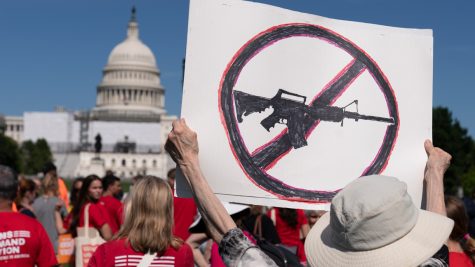Trump Tracker: Pioneer updates on America’s president
What Happened?
On Jan. 31, President Donald J. Trump nominated Judge Neil Gorsuch as the new Supreme Court Justice as the replacement for Justice Antonin Scalia, who passed away on Feb. 13, 2016.
Who is he?
Gorsuch has served on the U.S. Court of Appeals for the 10th Circuit since he was appointed by George W. Bush in 2006, according to SCOTUSBlog.com, the official blog of the Supreme Court that tracks developments within the department. Gorsuch was one of 21 potential candidates chosen by Trump’s team, according to the Los Angeles Times.
Gorsuch attended the University of Oxford, graduated from Harvard Law School with former president Barack Obama, worked with prominent conservative judges, such as Judge David Sentelle and Justices Byron White and Anthony Kennedy, according to SCOTUSBlog.com.
If approved, at 49 he will be the youngest member of the Supreme Court since Clarence Thomas who was 43 when he was appointed by George H.W. Bush in 1991, according to CNBC. Since 1900, only 12 Supreme Court justices have been under the age of 50.
Supreme Court justices serve in the position for life. When Trump announced his appointment of Gorsuch, he reminded Americans that a Supreme Court justice can be active for 50 years; however, according to CNN, justices serve an average of 25. The longest term to date was William O. Douglas who was appointed in 1939 and served for 36 years.
Where he stands on the issues
Numerous similarities have been noted between Gorsuch and Scalia’s judicial style and persuasive writing techniques: the SCOTUS blog called him a “natural successor.”
A Scalia trademark was his commitment to textualism, an interpretation of the law exactly as it was written, according to a review on Scalia’s book, “A Matter of Interpretation.” He spoke openly about his support of democracy “under the rule of law — rather than of men.”
Like his predecessor, Gorsuch is a textualist with a tendency to favor religious liberties and criticize the dormant commerce clause, a restriction that prohibits states from making laws that burden interstate commerce, according to the Cornell University Law School’s Legal Information Institute. Gorsuch gained notoriety for his ruling in favor of religious exemption the Hobby Lobby case of 2013.
The Christian family that owned the craft store chain Hobby Lobby sued the federal government over the Affordable Care Act’s mandate that employee insurance plans cover contraceptives, due to religious conflict, according to the Los Angeles Times. Gorsuch sided with the Christian owners.
A report published in December 2016 by researchers Lee Epstein, Andrew D. Martin and Kevin Quinn that evaluated Trump’s possible nominees for the position anticipate that Gorsuch will vote to limit gay rights, restrict abortion and dismantle affirmative action programs.







